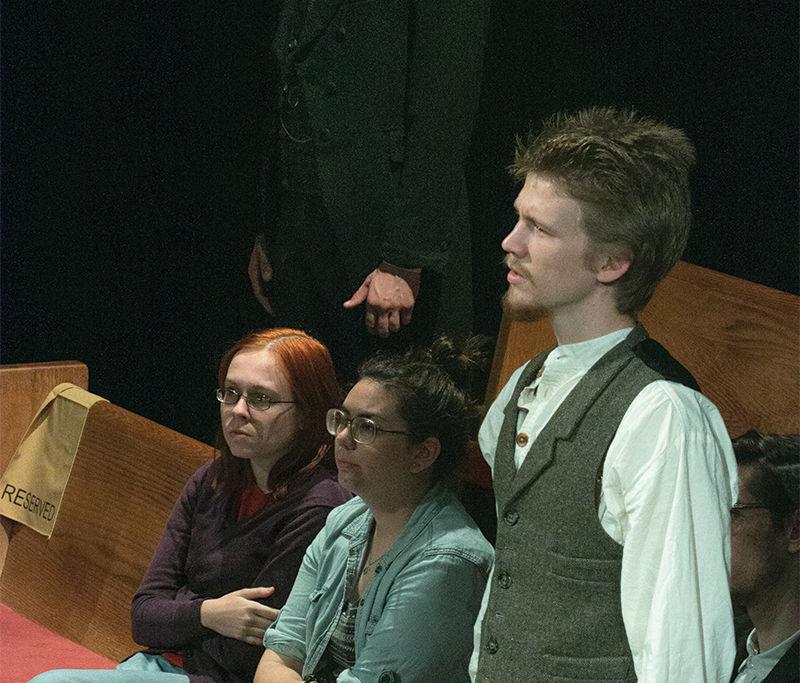Despite a lack of students studying performing arts such as music or theater, University Theatre flourishes — a result of the student body’s enthusiasm. According to a survey of University Theatre, engineering and communication tie as the most popular majors among students involved in the theater, with 10.9 percent of students participating in the survey. Business and accounting come second at 6.5 percent.
University Theatre hosts around five major shows each season which are open to all students regardless of major, as well as the Open Door Series, which gives students a central role in production and presents readings that are free to the public. In addition to shows, NC State offers theater courses and a theater minor.
Students note that having a theater program that is not limited by major or minor creates a diverse environment of people driven by dedication. The program’s small size ensures that every student that gets involved truly is dedicated and that they have a wide range of opportunities, as opposed to liberal arts-focused schools where majors may play a bigger role in how students are allowed to participate in theater.
“I feel like you get a much richer experience of theater by doing it at a STEM school, because you get so many more opportunities to branch out or explore,” said Fara Marin, a sophomore studying zoology and minoring in theater.
In addition, the differences and similarities between STEM and the arts creates an interdisciplinary experience which helps students improve their acting or their approach to their majors.
Nicole Hiemenz, a first-year engineering student, wants to study textile engineering or material science due to her experience with costume design throughout high school. As an actress in “Gross Indecency” and a member of the crew in “An Ideal Husband,” Hiemenz explains how the University Theatre’s Open Door Series has given students like her an opportunity to participate in operating lighting and creating costumes.
“A lot of what I’m learning in my physics class right now is actually transferring over into the lighting section since there’s a lot of science behind how electricity works and how sound works,” Hiemenz said. “In physics, I got a background on the human audible hearing range and stuff like that, and then I was able to actually apply it to something in the theater the very next day, with how a microphone works.”
These connections between science, math and theater can not only be found backstage, but also in the plays themselves. Natalie Sherwood, a senior studying polymer and color chemistry and minoring in theater and engineering, recalls that her first performance at NC State was directly related to what she was studying.
“The first show I was in here was called ‘Arcadia’ by Tom Stoppard,” Sherwood said. “My character was this young, kind of savant girl who was just brilliant at mathematics. The whole play had themes of these different mathematical theories, thermodynamics and relating them to how we view life. I remember some of the theories would come up in my calc class, so it was really neat.”
The main quality that all students seemed to take away from their experience in theater is a lesson in people skills such as learning how to work with others and communicate confidently, whether it is in academia or the workplace.
“Since I’ve been acting and I’ve been involved in theater, I’ve become such a more confident public speaker,” Sherwood said. “I know I can take stage, I can stand behind a podium and present a research presentation. That was something I did this past summer at an internship.”
Another issue that students face is the constant overvaluation of science, engineering and mathematics compared to the arts. When faced with the generalization that art is less practical, students responded by pointing out the value of interdisciplinary studies and the sheer importance of experience and self-expression.
“Because I’m an Honor’s Village fellow, I spend a lot of time with people who believe that the arts are kind of a necessary part of life,” said Carter Pape, a senior studying computer science and mathematics. “It wouldn’t be as rich of an experience if we didn’t have creative people living among us. I kind of see it as a proxy for spirituality, which is something you don’t get in engineering and don’t get in mathematics.”
Currently, University Theatre is performing “An Ideal Husband,” which will run throughout the week and finish its last performance on Sunday.
“Even in a period play like ‘Ideal Husband,’ it’s set so far back, but it talks about things that are relevant,” said Thomas Matrejek, an actor in the play and a junior studying computer and mechanical engineering. “It’s set in 1895, but it’s still talking about political corruption that’s present today. The arts represent what’s going on in our minds and our bodies and it allows us to express that.”








